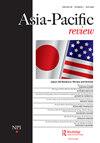50th Year of ASEAN-Japan Friendship and Cooperation: Roundtable Discussion of Track Record and Future Prospects
IF 0.5
Q4 INTERNATIONAL RELATIONS
引用次数: 0
Abstract
AbstractThe establishment of the ASEAN-Japan Forum on Synthetic Rubber in 1973 is said to be the beginning of the partnership between ASEAN and Japan. Half a century has passed since then, and the politics, economics, and societies of Japan and ASEAN countries have dramatically changed. Furthermore, the international and regional circumstances surrounding them are also significantly transforming. They are facing new challenges, such as the escalation of great power rivalry between the United States and China, the rise of protectionism and economic statecraft, the retreat of democracy, the middle-income trap, widening economic and social disparity, aging societies, growing environmental problems, and so on. How can these challenges be overcome through the new partnership between ASEAN and Japan? What should be specifically considered and implemented? With these issues in mind, four specialists exchanged their views at a roundtable discussion held at the International House of Japan on May 2, 2023. Additional informationNotes on contributorsOba MiePanel Chair and Report EditorOba Mie, Professor in the Faculty of Law, Kanagawa University. She obtained her M.A. and Ph.D. from the University of Tokyo. Her major is International Relations and politics in East Asia and Asia-Pacific, with a focus on the development of regionalism and Japan’s policy in terms of regionalism and relationship between Japan and Southeast Asia. She has published multiple articles and books both in Japanese and English, including “Further development of Asian regionalism: institutional hedging in an uncertain era” Journal of Contemporary East Asian Studies (2019), Jusoteki-Chiiki toshiteno Ajia: Tairitsu to Kyozon no Kozu [Asia as a Multi-layered Region: Co-existence in Conflicts], Yuhikaku (2014), Ajia Taiheiyo Chiiki Keisei heno Dotei: Kyokai-Kokka Nichi-Go no Aidentiti Mosaku to Chiiki-Shyugi [The Invention of the Asia Pacific Region: A History of Regionalism and Search for Identity by Japan and Australia as Liminal Nations], Minerva Shobo (2004). She received The 21st Ohira Masayoshi Memorial Prize (2005) and the 11th Nakasone Yasuhiro Incentive Award (2015). She was the Chairperson, Expert Panel for the 50th Year of ASEAN-Japan Friendship and Cooperation (until February 2023).Endo TamakiEndo Tamaki, Professor at Graduate School of Humanities and Social Sciences at Saitama University. Her research interests include the informal economy, urban development, inequality, and the global value chain. She received her Ph.D. in Economics (2007) from Kyoto University. Main publications are Living with Risks: Precarity & Bangkok’s Urban Poor (NUS Press association with Kyoto University Press, 2014), Goto, Endo and Ito [eds], The Asian Economy: Contemporary Issues and Challenges (Routledge, 2020) and Urban Risk and Well-Being in Asian Mega Cities: Urban lower and middle classes in Bangkok, Shanghai, and Tokyo, (Endo and Shibuya [eds], Routledge, 2023). She has received several awards including the 28th Ohira Memorial Prize and the 34th Daido Life Foundation Incentive Award for Area Studies. She was a member of the Expert Panel for the 50th Year of ASEAN-Japan Friendship and Cooperation (until February 2023).Jimbo KenPanel ParticipantsJimbo Ken, Professor of International Relations in the Faculty of Policy Management, Keio University and a Managing Director of Programs at the International House of Japan (IHJ/I-House). He is concurrently an adjunct Senior Research Fellow at the Canon Institute for Global Studies (CIGS). He served as Advisor to the Minister of Defense, Japan Ministry of Defense (2020), and Senior Advisor, The National Security Secretariat (2018-20). His main research interests are in International Security, Japan-US Security Relations, and Japan’s Foreign and Defense Policy. His policy writings have appeared in RAND Corporation, NBR, Stimson Center, Pacific Forum CSIS, The Japan Times, Nikkei, Yomiuri, Asahi, and Sankei Shimbun.Mieno FumiharuFumiharu Mieno, Professor of economics and director, Center for Southeast Asian Studies, Kyoto University. His major research areas are the financial system in economic development, the financial sector in Southeast Asia, and the economies of Southeast Asia, Thailand, and Indochina countries. His major publications are Kin’yu shisutem kaikaku to Tonan’ajia—choki suzei to kigyo kin’yu no Jissho bunseki [Financial Reform and Southeast Asia: Analyzing Regional Long-term Trends and Corporate Finance] (in Japanese, Keiso Shobo, 2015), Economic Transition in Myanmar After 1988: Market Economy Versus State Control, (NUS Press, Singapore, 2009), “Impact of Foreign Entry into the Banking Sector: The Case of Thailand in 1999–2014,” Pacific-Basin Finance Journal 2020. He has served as a board member of Japan Association of Asian Studies and Japan Association for International Development, East Asian Economic Association, and as an editorial member of Asian Economic Journal, and Developing Economies, etc. He also has led various policy dialogue programs by the Government of Japan on Myanmar and Laos since the early 2000s. He obtained a Ph.D. in Economics in 1999 at Hitotsubashi University. Before his current position, he worked as associate and full professor at Hosei University and Kobe University and also as visiting faculty at Thammasat University, Chulalongkorn University, and Columbia University.东盟-日本友好合作50周年:成果与展望圆桌会议
1973年成立的东盟-日本合成橡胶论坛被认为是东盟与日本伙伴关系的开始。半个世纪过去了,日本和东盟国家的政治、经济、社会都发生了巨大的变化。此外,围绕它们的国际和区域环境也在发生重大变化。他们正面临着新的挑战,例如中美之间的大国竞争升级,保护主义和经济治国方术的兴起,民主的退却,中等收入陷阱,经济和社会差距的扩大,社会老龄化,日益严重的环境问题等等。如何通过东盟与日本之间的新伙伴关系来克服这些挑战?应该具体考虑和实施什么?考虑到这些问题,4位专家于2023年5月2日在日本国际会馆举行的圆桌会议上交换了意见。附加信息:投稿人说明:小组主席兼报告编辑:日本神奈川大学法学院教授她在东京大学获得硕士和博士学位。她的专业是东亚与亚太国际关系与政治,主要研究区域主义的发展以及日本在区域主义和日本与东南亚关系方面的政策。她在日语和英语中发表了多篇文章和书籍,包括“亚洲地区主义的进一步发展:不确定时代的制度对冲”当代东亚研究杂志(2019),Jusoteki-Chiiki toshiteno Ajia: taiitsu to Kyozon no Kozu[亚洲作为一个多层区域:冲突中的共存],Yuhikaku (2014), Ajia Taiheiyo Chiiki Keisei heno Dotei。《亚太地区的发明:日本和澳大利亚作为边缘性国家的地域主义和身份寻求的历史》,上海大学学报(2004)。她获得了第21届大平正芳纪念奖(2005年)和第11届中曾根康弘激励奖(2015年)。她曾任东盟-日本友好合作50年专家小组主席(至2023年2月)。远藤玉木,埼玉大学人文社会科学研究生院教授。她的研究兴趣包括非正规经济、城市发展、不平等和全球价值链。她于2007年获得京都大学经济学博士学位。主要出版物是生活在风险之中:不稳定和曼谷的城市穷人(新加坡国立大学出版社与京都大学出版社,2014年),后藤,远藤和伊藤[编辑],亚洲经济:当代问题和挑战(劳特利奇,2020年)和亚洲大城市的城市风险和福祉:曼谷,上海和东京的城市下层和中产阶级,(远藤和涩谷[编辑],劳特利奇,2023年)。她获得了包括第28届大平纪念奖和第34届大堂生命基金会区域研究奖励奖在内的多个奖项。她是东盟-日本友好合作50年专家组成员(至2023年2月)。kenjimbo,庆应义塾大学政策管理学院国际关系教授,日本国际之家(IHJ/I-House)项目常务董事。他同时是佳能全球研究所(CIGS)的兼职高级研究员。他曾担任日本防卫省防卫大臣顾问(2020年)和国家安全秘书处高级顾问(2018- 2020年)。主要研究方向为国际安全、日美安全关系、日本外交与防务政策。他的政策文章曾在兰德公司、NBR、史汀生中心、太平洋论坛CSIS、日本时报、日经新闻、读卖新闻、朝日新闻和产经新闻发表。Mieno fumiharu Mieno,京都大学经济学教授、东南亚研究中心主任。主要著作有《金融改革与东南亚:区域长期趋势与企业融资分析》(日文,Keiso Shobo, 2015)、《1988年后缅甸的经济转型:市场经济与国家控制》(新加坡国立大学出版社,2009)、《外资进入银行业的影响:1999-2014年泰国的案例》,《太平洋盆地金融杂志》2020年版。他曾担任日本亚洲研究协会、日本国际发展协会、东亚经济协会理事,并担任《亚洲经济》、《发展中经济体》等杂志的编辑委员。 自21世纪初以来,他还领导了日本政府关于缅甸和老挝的各种政策对话项目。他于1999年获得一桥大学经济学博士学位。在担任现职之前,他曾在法政大学和神户大学担任副教授和正教授,并在法政大学、朱拉隆功大学和哥伦比亚大学担任客座教授。
本文章由计算机程序翻译,如有差异,请以英文原文为准。
求助全文
约1分钟内获得全文
求助全文

 求助内容:
求助内容: 应助结果提醒方式:
应助结果提醒方式:


